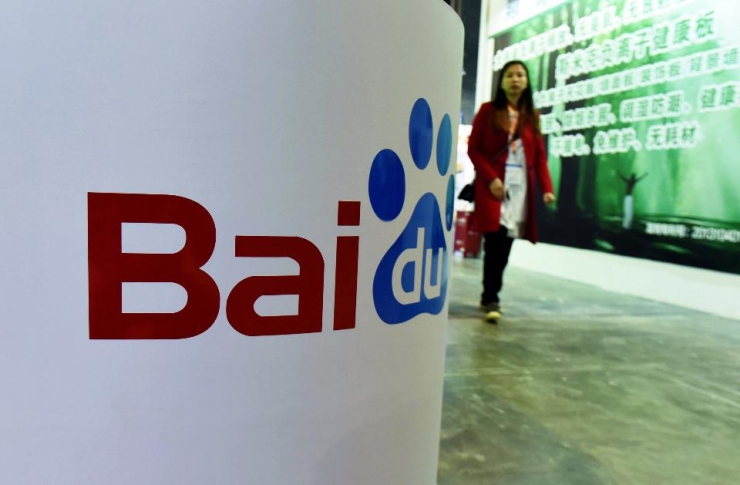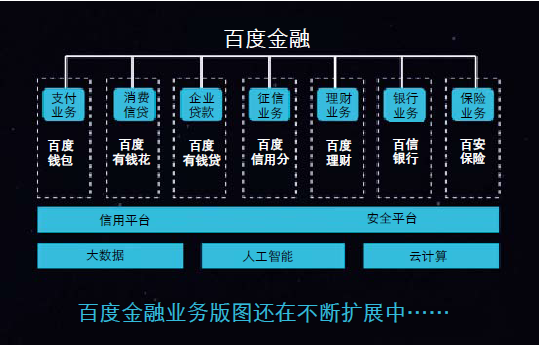
Zhang Xuyang, the vice president of Baidu, who had just left from Everbright Bank and joined Baidu recently, said in a speech that the great fintech company should be a company with a temperature. Baidu is willing to work hard to become a great financial technology company. The financial technology that Baidu mentioned in his speech was mainly artificial intelligence and other technologies. However, "Forbes" reported that although Baidu wants to pursue business growth beyond the core business Internet search, but if the next goal is financial technology, in view of its recent transactions, this is probably Baidu wishful thinking.
Recently, Baidu announced that it will make an undisclosed amount of investment to U.S. fintech company Zest Finance, which combines machine learning with big data analytics to provide more accurate credit scores. In the statement, the two companies stated that Zestfinance will use its artificial intelligence technology to convert Baidu's search, location, and payment data into consumer credit scores. In China, there is no such national credit rating mechanism as the US FICO score.
This is another move for Baidu to deploy artificial intelligence + finance. Baidu’s core business is Internet search, but the business is currently facing greater pressure. After the Wei Zexi incident, the company lowered its forecast for second-quarter revenue by 10% in June. In addition, Baidu has also been exposed a few days ago to promote betting at night, and the official investigation results have not yet been announced.
Before he ventured into this new business of credit assessment, Baidu participated in the US$60 million round of financing in Circle China, a US blockchain payment startup, in June. At the end of last year, Baidu joined Allianz Insurance and Gaochun Capital to set up Baian Insurance to use its strength in Internet insurance. In order to supervise these business operations, Baidu has also set up a financial service organization internally.
Largely laid out a little-known Baidu FinanceWang xiaoyan, an analyst at Shanghai 86 Research Co., Ltd., said: "Baidu has always sought growth beyond search. After investing heavily in O2O, it began to pay attention to financial technology."
Baidu also tried to make money through video services. However, in February 2016, Baidu announced that Robin Li and IGI CEO Gong Yu jointly initiated a privatization offer to Baidu’s board of directors and planned to acquire 80.5% of iQiyi held by Baidu. The entire valuation of 2.8 billion U.S. dollars in shares. And just the day before yesterday, Acacia Partners, a US hedge fund that is one of Baidu’s major shareholders, said that the icky’s 2.8 billion dollar valuation is too low, infringing the interests of Baidu and its shareholders and demanding the cancellation of ongoing love. Fantastic arts privatization.

Despite all these efforts, Baidu has not made much progress in financial technology. As shown in the above figure, the layout of Baidu's layout finance has been expanding, and Zhang Xuyang has been digging into asset management. However, behind Baidu's continuous movement, there is still a lack of explosive products, and there is a long gap between financial services such as Alibaba and Tencent. For Baidu, financial technology is already a late-stage market and faces a double monopoly between Alibaba and Tencent. Analysts said that Baidu’s chance of winning a certain share from these two long-term competitors is very slim.
Muzhi Li, an analyst at Arete Research in Hong Kong, said Baidu began investing in Internet finance as early as 2013, which is a long time later than its peers. Furthermore, although Baidu’s financial licenses already cover many areas, it even surpassed Tencent. From payment, consumer credit, credit information to funds, securities, insurance, banking, and crowdfunding, Baidu Finance has covered most of the Internet finance business. However, it is very difficult for consumers to tell which Baidu Financial product is known.
Credit Suisse estimates in February that, as of last year, Alipay, the financial arm of Alibaba's financial arm, had a market share of 58% of China's online payment, and Tencent's WeChat payment was 20%. And the two giants will further consolidate their market share and expect to reach 59% and 25% respectively in 2018. At the same time, Baidu’s payment application Baidu’s wallet is not even ranked in the top five.
As of the end of last year, the number of Baidu wallet active accounts has indeed achieved unprecedented growth, but as of the first quarter of this year, the total number of users was only a total of 65 million. Compared with its peers who started laying out technology finances early on, Baidu Wallet’s user community is too small. According to statistics, as of the end of February 2016, the number of Alipay real-name users has exceeded 450 million. In addition, WeChat payment also reached 400 million users in the first quarter of this year. In this way, how does Baidu compete with other starters?
Baidu's big data chips Li Yanhong once said that after big data, artificial intelligence will become a new outlet. He believes that artificial intelligence and finance can really upgrade credit information and get rid of traditional methods. If Baidu Finance and artificial intelligence are combined, the first one may be foreign-based artificial intelligence financial services—based on Baidu artificial intelligence technology to develop intelligent investment advice and provide users with automated asset management services. Followed by the insurance business area, smart wind control operations.
The person in charge of Baidu Finance stated that massive data is the starting point and chip for Baidu's development of financial technology. As a search engine company, Baidu currently has more than 600 million mobile users and 14 million mobile applications. The daily search request reaches 6 billion times, and the business is spread over more than 200 countries in the world, while the Chinese Internet users perform an average of 10 times per day. Baidu search.
However, analyst Wang Xiaoyan said that the lack of a popular payment application does not bode well for Baidu's online banking and insurance business. In contrast, Alibaba and Tencent have started to embed credit loans and wealth management products in payment applications so they can direct traffic for other services. Their respective applications also collect a large amount of financial behavior data to support the company's credit and loan business.
On the contrary, Wang Xiaoyan said that focusing on the development of artificial intelligence, autopilot and other technologies may be better for Baidu. In the past, Baidu has already started driverless testing in Beijing. In May this year, the company signed an agreement with the Wuhu municipal government to gradually introduce Baidu’s driverless cars over the next five years. "Baidu has top scientists. Compared with Internet finance, the development of cutting-edge technology is more opportunity for Baidu."
Although it is said that the combination of artificial intelligence and finance is also cutting-edge technology, but in the face of the fintech market that has gradually been seized by Ali, Tencent, and Jingdong, how much space and advantage does Baidu have, and Li Yanhong has succeeded in catching the winning streak? And wait and see.
Commercial Semi-hermetic Screw Compressor Sight Glass Sight Glass
Shenzhen Capitol Micro-Electronics Co.,LTD , https://www.capitolgtms.com